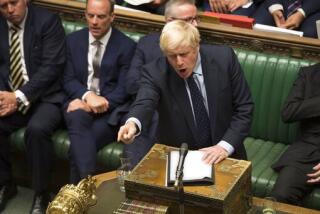Britain Will Resist European Federalism, Major Says : Europe: London wants an agreement at the upcoming EC summit, but the prime minister appears to move away from a conciliatory stance.
- Share via
LONDON — Prime Minister John Major opened a major debate in Parliament on Wednesday, setting down Britain’s conditions for signing a political and economic treaty with its European Community partners at next month’s summit.
His stark warning that Britain would resist any move toward European federalism--what some Britons see as a possible way to usurp their nation’s sovereignty--put him in blunt opposition to European Commission President Jacques Delors.
Earlier Wednesday, Delors insisted that the European Community must be fully “federal.” He has grandly envisioned it almost as a United States of Europe.
In his tough speech during a rowdy session, Major seemed to move away from the conciliatory line that the British government has pursued toward the EC since Euro-skeptic Margaret Thatcher resigned as prime minister a year ago.
But Major said his government is seeking an agreement at the “crucial” meeting, since Britain is a “leading member” of the EC.
In the two-day debate, Thatcher declared that she would support the government but urged it not to be intimidated at the EC summit.
To much laughter, she said that just as she would have wielded her handbag at the EC meeting, Major would be carrying his cricket bat. “That’s a good thing because it will be harder,” she said.
She also came out strongly against giving up any parliamentary sovereignty and against accepting a single currency--without a nationwide referendum. “What we are talking about is the rights of the British people to govern themselves under their own laws made by their own Parliament,” she declared in only her second Commons speech since her resignation.
Opposition Labor Party leader Neil Kinnock cautioned that Britain’s “opting out” of close ties with the EC would mean “losing out on jobs and prosperity.” He said the British want their country to “take the lead in the EC.”
Major suggested that EC members should not hold the “misconception” that Britain, after a tough argument at the summit, would “sign up to whatever is on offer at the 59th minute of the 11th hour.”
He said that Britain would not agree to the inclusion of the words “federal vocation” in the new political treaty, nor to the immediate imposition of a single currency, which is part of an economic and monetary treaty.
The EC’s original constitution, the Treaty of Rome, is scheduled to be amended at the EC summit on Dec. 9-10 in Maastricht, the Netherlands. But Britain has so far opposed the Dutch-circulated treaty texts.
In Strasbourg on Wednesday, Delors poured scorn on Britain’s opposition to a federal European union in a speech to the European Parliament and called for “wholesale extension” of majority voting. “There is a misunderstanding about what ‘federal’ is in the first place,” the head of the EC’s executive arm said, “even if there is a special definition in the English dictionaries. We have to define who has the powers.
“There is not a single example of a group of nations which has survived purely on the basis of intergovernmental arrangements,” he added. “That was not the vision of the EC’s founding fathers.”
Under the original EC treaty, decisions on political matters must be by consensus, that is, unanimous. Those involving economic matters can be decided by a majority, with the minority not forced to go along. Delors argued Wednesday that for the EC to follow any coherent foreign policy, its decisions must be made by a majority, not a unanimous vote. The current practice has produced a “kind of organized schizophrenia,” he said.
Delors’ statement was seen here as a direct rebuke to Major’s administration, which has insisted on EC unanimity in voting on important foreign policy and defense matters.
In his House of Commons speech, Major emphasized that the North Atlantic Treaty Organization should be paramount in Europe’s defense, with the nine-nation Western European Union being the European pillar, rather than a competing force. He also stated that Britain does not accept the Franco-German proposal for an army corps that would serve as the core of European military defense but not under NATO command.
On the surface, at least, Major’s overall views, expected to be backed up in a parliamentary vote today, pit Britain against almost all of the 11 other EC members, which tend to favor closer political and economic union.
Major is insisting that the EC should take on only those problems that cannot be handled by individual countries, such as local pollution controls, union regulations and social provisions. But Germany, for instance, wants to give the European Parliament greater powers, and France wants to see the European Commission’s importance enhanced.
“For an agreement to be reached at Maastricht there must be give-and-take on both sides,” Major said.
More to Read
Sign up for Essential California
The most important California stories and recommendations in your inbox every morning.
You may occasionally receive promotional content from the Los Angeles Times.













